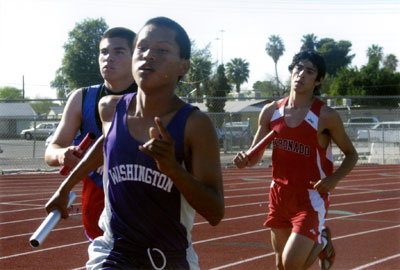All Nonfiction
- Bullying
- Books
- Academic
- Author Interviews
- Celebrity interviews
- College Articles
- College Essays
- Educator of the Year
- Heroes
- Interviews
- Memoir
- Personal Experience
- Sports
- Travel & Culture
All Opinions
- Bullying
- Current Events / Politics
- Discrimination
- Drugs / Alcohol / Smoking
- Entertainment / Celebrities
- Environment
- Love / Relationships
- Movies / Music / TV
- Pop Culture / Trends
- School / College
- Social Issues / Civics
- Spirituality / Religion
- Sports / Hobbies
All Hot Topics
- Bullying
- Community Service
- Environment
- Health
- Letters to the Editor
- Pride & Prejudice
- What Matters
- Back
Summer Guide
- Program Links
- Program Reviews
- Back
College Guide
- College Links
- College Reviews
- College Essays
- College Articles
- Back
Running Fast MAG
Fasting without food or drink (including water) from two hours before sunrise until sunset during the long days of October is difficult; however it is even more difficult when, in addition, I need to run five miles a day and perform well in school. As part of being a Muslim, I am required to fast for 30 days during the Islamic month of Ramadan. However, as a varsity cross-country runner, I also need to practice during this month. So I was presented with the decision either to run cross-country or to fast for
Ramadan.
As I contemplated the effects of each, I had an epiphany - I could both fast and run. Ramadan landed on a critical time in my cross-country season: the month before the state meet. That meant I would not just be required to fast and practice, I would need to fast and practice hard in order to get in shape for the sectional meet so that we could make it to state. I was the number four varsity runner, so my team depended on me.
During the weeks leading up to Ramadan, I tried to pack on as many calories as I could, so I would have some fat stored to provide me with the energy required to run hard at practices. I knew that fasting, running, and studying for school would be difficult; however my only option was to succeed. I decided that I wouldn’t look at these commitments as setbacks, but instead as challenges that would make me stronger.
I prepared myself for the month of Ramadan, so when the first day came, instead of focusing on not eating or drinking, I focused on my ancillary objectives - running and school. Two hours before sunrise, I woke and ate a large, high-calorie breakfast and drank almost two liters of water to use for the rest of the day. I ran at practice that day, albeit in a semi-dehydrated state. When I finished I felt like I had accomplished something. Immediately after sunset, I ate and drank as much as I could, which wasn’t much because my stomach had shrunk during the day in reaction to the lack of food. I had to force myself to eat again later in the evening to compensate for fasting. I felt exhausted again that night when I went to sleep, but because I felt so satisfied, I decided to continue fasting and running for the rest of the month. Although some days were more difficult than others, I kept a positive mindset and followed my plan.
I managed to maintain solid grades in school and still ran well at meets. Although we didn’t make it to state, we placed third at sectionals. And I fulfilled my commitment to my team and to my religion.

Similar Articles
JOIN THE DISCUSSION
This article has 6 comments.
We fast b/c we believe it is good for us. adults (ages 12+) are required to fast. sick, eldery, and people with certain conditions don't have to.
That is actually one of the points i admire Muslims for... the commitment they feel for their religion and their determination...
but i also have a question for you...
what does it mean to fast for you...is it mere commitment? do you do it because you have the duty to do it or any particular reason like for example because you have the need to fast.
You must understand that this is just a question,out of sheer curiosity..

0 articles 0 photos 12292 comments